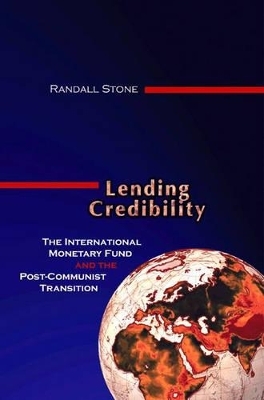
Lending Credibility
Princeton University Press (Verlag)
978-0-691-09529-5 (ISBN)
- Lieferbar (Termin unbekannt)
- Versandkostenfrei
- Auch auf Rechnung
- Artikel merken
With the end of the Cold War, the International Monetary Fund emerged as the most powerful international institution in history. But how much influence can the IMF exert over fiercely contested issues in domestic politics that affect the lives of millions? In Lending Credibility, Randall Stone develops the first systematic approach to answering this question. Deploying an arsenal of methods from a range of social sciences rarely combined, he mounts a forceful challenge to conventional wisdom. Focusing on the former Soviet bloc, Stone finds that the IMF is neither as powerful as some critics fear, nor as weak as others believe, but that the answer hinges on the complex factor of how much credibility it can muster from country to country. Stone begins by building a formal, game-theoretic model of lending credibility, which he then subjects to sophisticated quantitative testing on original data from twenty-six countries over the 1990s. Next come detailed, interview-based case studies on negotiations between the IMF and Russia, Ukraine, Poland, and Bulgaria.
Stone asserts that the IMF has exerted startling influence over economic policy in smaller countries, such as Poland and Bulgaria. However, where U.S. foreign policy interests come more heavily into play, as in Russia, the IMF cannot credibly commit to enforcing the loans-for-policy contract. This erodes its ability to facilitate enduring market reforms. Stone's context is the postcommunist transition in Europe and Asia, but his findings carry implications for IMF activities the world over.
Randall W. Stone is Associate Professor of Political Science at the University of Rochester. He is the author of "Satellites and Commissars" (Princeton).
List of Figures xi List of Tables xiii List of Acronyms xv Preface xix 1. Introduction 1 1.1 The Strategy of Transition: Inflation and Democracy 6 1.2 What Would We Like the IMF to Do? 10 I Models and Data 13 2. A Formal Model of Lending Credibility 15 2.1 The Model 21 2.2 The Equilibrium 22 2.3 Hypotheses Derived from the Formal Model 26 2.4 Conclusions 27 Appendix: A Formal Model of Lending Credibility 29 3. Studying IMF Effectiveness 39 3.1 Previous Research 39 3.2 Critiques Raised in the Literature 46 3.3 New Critiques 48 3.4 Research Design 49 3.5 Conclusions 58 4. An Empirical Test of the Model 59 4.1 Models of IMF Lending Decisions 60 4.2 Covariates of the Duration of Punishment Intervals 61 4.3 Covariates of Program Suspensions 67 4.4 Models of Policy Variables 73 4.5 Conclusions 84 II History 87 5. Poland 89 5.1 The Balcerowicz Plan 90 5.2 The Extended Fund Facility 99 5.3 The Second Stand-by Agreement 106 5.4 Poland's Turn to the Left 109 5.5 Conclusions 114 6. Russia 116 6.1 The Window of Opportunity Closes: 1992 118 6.2 The First Stand-by Agreement, July 1992 120 6.3 The Systemic Transformation Facility: May 1993 126 6.4 The STF Renewal, April 1994 128 6.5 The Second Stand-by Arrangement, April 1995 136 6.6 The Extended Fund Facility, February, 1996 138 6.7 The Third Stand-by, July 1998 153 6.8 The Fourth Stand-by, July 1999 158 6.9 Conclusions 164 7. Ukraine 169 7.1 From Hyperinflation to Market Reform, 1992-1994 170 7.2 The Systemic Transformation Facility, 1994 177 7.3 The First Stand-by, 1995 179 7.4 The Second Stand-by, 1996 183 7.5 The Third Stand-by, 1997 190 7.6 The Extended Fund Facility, 1998 196 7.7 Conclusions 207 8. Bulgaria 209 8.1 False Starts, 1990-1994 210 8.2 The Origins of the Crisis, 1995-1996 217 8.3 Consolidation under the Currency Board 227 8.4 Conclusions 231 9. Conclusion 233 9.1 Research Design 234 9.2 Policy Implications 239 Appendixes 243 A. Data 245 B. Statistical Methods 250 B.1 Multiple Imputation 250 B.2 Duration Models 254 C. List of Interviews 262 Bibliography 266 Index 279
| Erscheint lt. Verlag | 14.7.2002 |
|---|---|
| Zusatzinfo | 18 tables |
| Verlagsort | New Jersey |
| Sprache | englisch |
| Maße | 152 x 235 mm |
| Gewicht | 425 g |
| Themenwelt | Sozialwissenschaften ► Politik / Verwaltung ► Europäische / Internationale Politik |
| Sozialwissenschaften ► Politik / Verwaltung ► Staat / Verwaltung | |
| Wirtschaft ► Betriebswirtschaft / Management ► Finanzierung | |
| Betriebswirtschaft / Management ► Spezielle Betriebswirtschaftslehre ► Bankbetriebslehre | |
| Wirtschaft ► Volkswirtschaftslehre ► Finanzwissenschaft | |
| Wirtschaft ► Volkswirtschaftslehre ► Makroökonomie | |
| Wirtschaft ► Volkswirtschaftslehre ► Wirtschaftspolitik | |
| ISBN-10 | 0-691-09529-9 / 0691095299 |
| ISBN-13 | 978-0-691-09529-5 / 9780691095295 |
| Zustand | Neuware |
| Haben Sie eine Frage zum Produkt? |
aus dem Bereich


